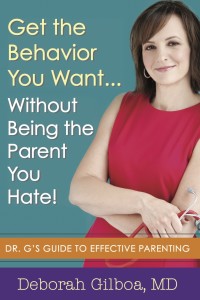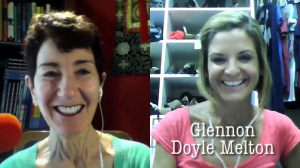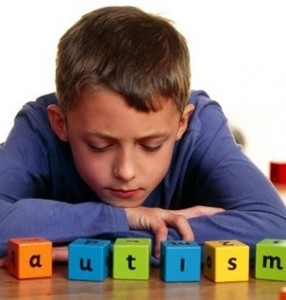|
|
December 10, 2014
 I’m Annie Fox and I approve this message! I read lots of parenting books, but only recommend the top notch. That means they deliver pragmatic advice in small, well-organized, chunks of digestible wisdom. No big chunks, please. Who’s got the time? It helps a lot if the book’s tone is so engaging I can imagine the author talking to me over a cup of coffee. Also, it’s a good thing if the descriptions of parent-child interactions are so spot-on I’m chuckling and misting over throughout. (Yes, a good parenting book is as likely to make me cry as it is to have me laughing and calling out to David, “Sweetie, you’ve gotta hear this!”) Added requirement for any great parenting book: I have to learn something new. Not so easy because, as I said, I read loads of them.
For all the above reasons, I’m happy to recommend Dr. Deborah Gilboa’s latest book, Get the Behavior You Want Without Being the Parent You Hate. Before I tell you what I learned, let me tell you who needs this book – Any parent who has ever wondered if there’s a better way to get your child to:
1. Brush his/her teeth
2. Get along better with siblings
3. Quit whining about being “booooorrrrreeeed” and learn to manage their free time creatively
4. Do something you require without your constant nagging
… plus fifty other things that kids need to learn in order to be become respectful, responsible, and resilient young adults.
Dr. Gilboa, aka @AskDocG, is a practicing family physician, and a parenting expert. She’s also the mom of four boys who, have apparently brought her to edge of sanity more than once. In the book’s introduction she admits that she has “nagged, yelled at, threatened, and guilted my children to try to get them to behave well. Not all of the time, and usually not on purpose, but, just like many parents, I’ve done all this and more. Not only do I feel really horrible about it afterwards, but (and here is the kicker) it doesn’t work.” So you see, Doc G is also honest, humble and funny. What’s not to like?
Listen to my podcast interview with Doc G.
As for what I learned from Get the Behavior You Want… it came from section 5: What you do is more important than what you feel. Think about it for a minute. Most of the time we mindful parents do our best to get our children in touch with their feelings. “How do you feel now, sweetheart?” “And how did what he said this morning make you feel?” “How do you think you’ll feel about that tomorrow?” The message to kids: how they feel is pretty much the most important thing. Doc G points out that feelings are important, but they should not be accepted as an excuse for poor behavior. Something parents do all the time!
We do it when we say, “Oh, she’s just in a bad mood.” “He’s had a hard day.” “She’s overtired.” Doc G teaches that we need to help our kids become accountable for their behavior. And we can accomplish that by empathizing with our kids’ feelings (“I understand why that made you angry….”) while still sticking with our standards of behavior (“….but biting is totally unacceptable in this family. And here’s the consequence for the doing it…”)
It’s not always easy for an unhappy, overtired child to accept responsibility for his or her actions, but parenting is all about clear standards and consistent responses, isn’t it?
Thanks, Doc G!
Try making this shift in the way you deal with unacceptable behavior from your kids and let me know how it goes.

May 30, 2014
 How come all conversations aren’t this full of life? I first heard about Glennon Melton (@Momastery) on Twitter. One link led to another, as so many do, and I found myself watching, no devouring her very funny, poignant, smart TedX talk.
I immediately reached out for a review copy of her book Carry On, Warrior: The power of embracing your messy, beautiful life because I love freebies and I actually wanted to get inside this woman’s head some more. I read the book in like two days. Laughed (a lot), thought (a lot), and cried (a bit). I was hooked on this flamboyant, authentic writer who’s got something special going on. I can say that with authenticity because I read a lot of parenting books. (Shameless plug alert! Why yes, I have written one myself. Thank you so much for asking.) But how can anyone resist a book with delicious sentences and paragraphs like these?
The other night at dinner, Craig and I demanded that the kids clean their plates even though dinner was, admittedly, gross. One nanosecond before this suggestion was made, we were laughing, talking about Daddy’s day at work, planning our upcoming weekend, and generally feeling like a lovely, well-adjusted family. Then–ambushed by ourselves again–there was crying, screaming, heads banging on tables. Immediate anarchy. Instant chaos.
My first instinct is to remember that yes, this chaos is proof that I have ruined my life and the lives of everyone in my home and that we are a disaster of a family and that no mother, in the entire history of mothers, has ever been forced to endure the drama, decibels, and general suffering of this moment. My instinct is to tear my clothes and throw myself on the floor and bawl and cry out worthless declarations like, “I can’t TAKE this anymore!” My first instinct is to allow my anxiety and angst to pour out like gasoline on a raging fire and indulge in a full-on mommy meltdown.
This, Craig suggests, is not helpful.
I, for one, could not resist. Nope. Especially not after reading that last sentence. And apparently a bunch of other sisters of another mother couldn’t either as Carry on, Warrior is now a New York Times bestseller. (Way to go, Glennon!)
So I just had to interview Glennon for my Family Confidential podcast. I did and, oh Momma, did we have a blast. You can listen in here.

April 7, 2014
 Let me spell it out for you It’s Autism Awareness Month and organizations like Autism Speaks do a tremendous job in the areas of education, research funding, and providing resources for families. A couple of years ago, at this time of year, I was on a quest to learn more when I heard about Carly’s Voice : Breaking Through Autism by Arthur Fleischmann. I read the synopsis: “At the age of two, Carly Fleischmann was diagnosed with severe autism and an oral motor condition that prevented her from speaking. Doctors predicted that she would never intellectually develop beyond the abilities of a small child. Although she made some progress after years of intensive behavioral and communication therapy, Carly remained largely unreachable. Then, at the age of ten, she had a breakthrough.
While working with her devoted therapists Howie and Barb, Carly reached over to their laptop and typed in “HELP TEETH HURT,” much to everyone’s astonishment. This was the beginning of Carly’s journey toward self-realization.”
I was hooked, got my hands on the book and read it in three days. All I could think was, “Wow! There goes a whole bunch of assumptions about autism.” I was blown away by Carly’s intelligence, her wit, and her drive to communicate and be understood. I was also touched and inspired by her father’s relentless commitment to connect with her. I had to learn more about the story behind this story. I wanted to interview Arthur Fleischmann.
Social media being what it is, connecting with Arthur was easy. He graciously accepted my invitation to be my guest on Family Confidential. What a fascinating, dynamic and very personal conversation we had. I’m so pleased to share with you this never-before-published interview. Aruthur’s chronicle of life with his daughter Carly provides us all something to think about, especially when it comes to giving everyone the respect he or she deserves plus the opportunity to be heard. Listen here.

March 31, 2014
 An essential book for adoptive parents When kids “act out” you’d better believe strong emotions are the drivers. Parents and teachers usually pay attention to the behavior without taking time and patience to dig deeper and discover the trigger that unleashed the storm. What’s causing such distress in this child that s/he is acting this way? Discovering the answer is key to understanding children and ultimately helping them a) understand themselves better b) effectively manage their destructive emotions c) express themselves in socially responsible ways so that d) they can get their needs met without causing harm to themselves or others.
This truth was illustrated beautifully in a story Dr. Karyn Purvis told me during our interview for my podcast, Family Confidential back in 2010. Dr. Purvis is a Developmental Psychologist and Director of the Institute of Child Development at Texas Christian University (TCU) in Fort Worth. For the past decade, she and her colleagues have been developing research-based interventions for at-risk children. Dr. Purvis is also the co-author of The Connected Child: Bring Hope and Healing to Your Adoptive Family, a book that has helped countless adoptive and foster parents better connect with their children who have come from “hard” places.
In our recorded conversation Dr. Purvis tells me about a little girl playing in the kitchen while her mom makes dinner. The girl asks for a candy bar. Mom says, “No, sweetheart. Dinner will be ready in ten minutes.” The girl has a full-fledged meltdown, screaming, crying inconsolably. She throws things and physically and verbally abuses her mother. Mom has no idea what’s going on and feels powerless to help her daughter.
In desperation, Mom turns to Dr. Purvis and comes away with a better understanding of what was going on and how to meet her little girl’s needs without giving her candy every time she asks. Turns out this child was adopted from an orphanage where she often did not get enough to eat. When her mom said “no” to the candy, the girl panicked and remembered feeling powerless as she cried out in hungry, only to be ignored. Dr. Purvis’ compassionate response helped the mom and the child immeasurably. What was the solution?
You need to hear my never-before-published interview with Karyn Purvis, an educator for whom I have the highest respect and admiration. Listen in.

| |















